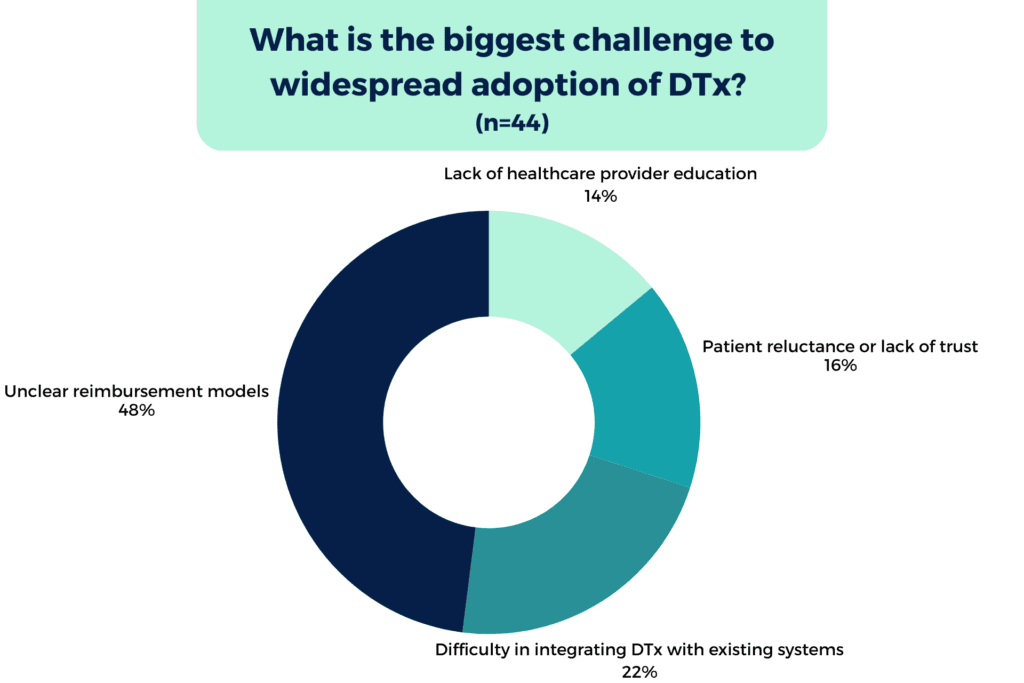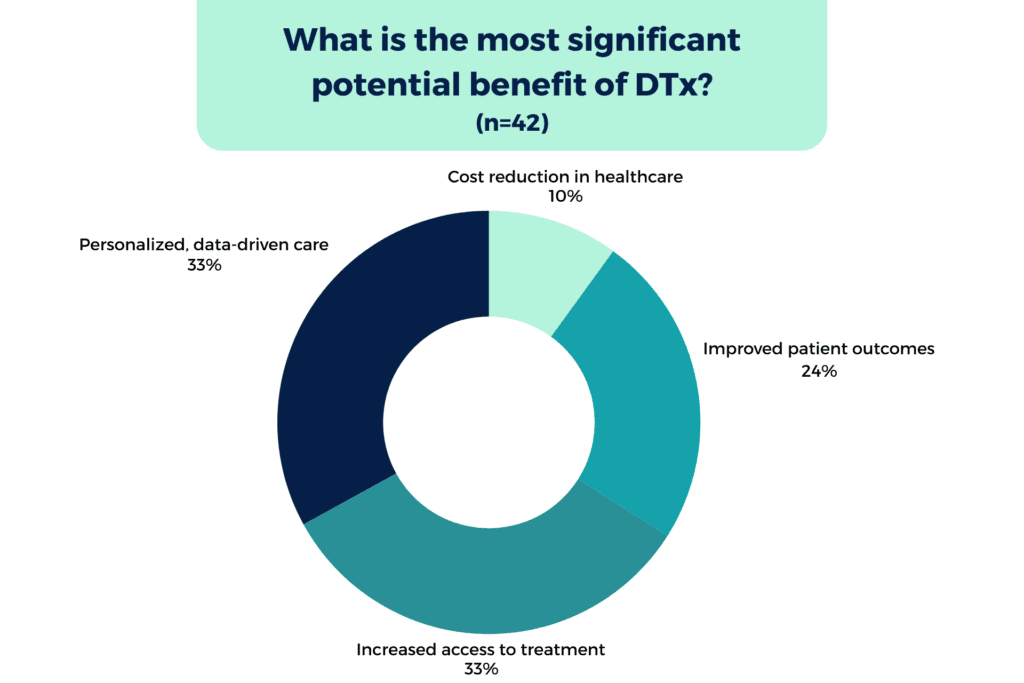The Rise of Digital Therapeutics: Transforming Healthcare in the Digital Age

DATE
November 14, 2024
AUTHOR
Tereza | Senior Customer Success Manager
In an era where technology permeates every aspect of our lives, it’s no surprise that healthcare is undergoing a digital revolution. At the forefront of this transformation are digital therapeutics (DTx), a rapidly growing field that promises to reshape how we approach treatment and patient care.
Recently, industry expert Dr. Spencer Jones, Digital Health Consultant and former Executive Director – Global Digital Health at Bristol Myers Squibb, shared his insights on this exciting domain in a Climedo Connect webinar.
Demystifying Digital Therapeutics
What exactly are digital therapeutics? As Spencer explained, they are software-based interventions, sometimes incorporating hardware, designed to treat or manage medical conditions and improve health outcomes. Unlike general health apps, DTx are specifically created to have a direct impact on patient health, often complementing or even replacing traditional medications and therapies.
The potential of DTx is immense, with market predictions suggesting sales in the tens of billions of dollars within just a few years. This growth is driven by a perfect storm of factors: governmental initiatives pushing for digital health solutions, rapid technological innovations and an increasing understanding of the benefits these digital tools can offer.
However, as with any emerging field, digital therapeutics face their share of challenges. Patient reluctance, limited prescription capabilities for healthcare providers and complex reimbursement models are just a few of the hurdles the industry must overcome.
Interestingly, when polled about the biggest challenge to DTx adoption, nearly half of the Climedo Connect webinar attendees (48%) identified unclear reimbursement models as the primary obstacle.

Real-World Success Stories
Despite these challenges, digital therapeutics are already making a significant impact. Spencer highlighted several success stories that demonstrate the potential of DTx:
Take Click Therapeutics’ Clickotine, for instance. This digital solution helps users quit smoking, boasting an impressive 45% success rate after just eight weeks. With $42 million in revenue, it’s a clear example of how digital therapeutics can address major public health issues effectively.
Then there’s Big Health’s Sleepio, a clinically validated insomnia treatment. With over $35 million in revenue, Sleepio showcases how digital solutions can tackle sleep disorders, a growing concern in our always-on society.
Another standout is Migraine Buddy, now part of Voluntis. This migraine tracker has amassed millions of active users, illustrating the appetite for tools that help patients manage chronic conditions.
These examples underscore the diverse applications of digital therapeutics, from addiction treatment to mental health support and chronic disease management.
The Multifaceted Benefits of Digital Therapeutics
The advantages of digital therapeutics extend far beyond their novelty. When asked about the potential benefits of DTx, webinar attendees were split, with equal numbers (33% each) highlighting increased access to treatment and personalized data-driven care as key advantages.

Indeed, one of the most significant benefits of digital therapeutics is their ability to democratize access to treatment. With smartphones becoming ubiquitous even in less affluent areas, DTx can reach patients who might otherwise struggle to access traditional healthcare services.
Moreover, these digital solutions offer the promise of truly personalized care. By leveraging data and adaptive algorithms, DTx can tailor treatments to individual patients, potentially improving outcomes and patient adherence.
Cost-effectiveness is another crucial advantage. Several meta-analyses have shown that digital therapeutics can be cost-effective across various therapeutic areas, from diabetes management to cardiovascular disease prevention. In an era of spiraling healthcare costs, this aspect of DTx is particularly appealing to healthcare systems and payers.
Navigating the Challenges
Despite their potential, digital therapeutics face several hurdles on the path to widespread adoption. Spencer emphasized that while regulatory approval and reimbursement models are often seen as the primary challenges, other factors shouldn’t be overlooked.
Integration with existing healthcare systems, for instance, remains a significant obstacle. Electronic Health Record (EHR) integration is notoriously complex, and without seamless integration, the full potential of DTx may not be realized.
However, Spencer argued that two often-neglected areas deserve more attention: market penetration and the twin challenges of healthcare provider endorsement and patient engagement.
“We often develop the engine in a very scientific way,” Spencer noted, referring to the core therapeutic component of DTx. “But then for some reason, we think that we can just put this into an app and then publish it and everyone will use it. That’s not how it works.”
Indeed, creating an effective digital therapeutic is only half the battle. Ensuring that healthcare providers understand and are willing to prescribe these digital solutions is crucial. Equally important is designing the user experience in a way that encourages ongoing patient engagement.
Spencer suggested that DTx developers could learn from the strategies employed by social media and gaming apps. By incorporating elements of behavioral science, including subtle reward mechanisms and personalization, DTx could become more engaging and effective.
The Road Ahead
Looking to the future, Spencer painted an optimistic picture of where digital therapeutics might lead us. He envisions a healthcare landscape transformed by increased personalization, data-driven approaches for improved outcomes and proactive, predictive models of care.
Collaboration will be key to realizing this vision. Spencer emphasized the need for developers, healthcare professionals, policymakers and pharmaceutical companies to work together, combining their unique skills and perspectives to drive the field forward.
As we stand on the brink of this digital health revolution, it’s clear that digital therapeutics have the potential to reshape healthcare as we know it. By providing accessible, personalized and cost-effective treatments, DTx could help address some of the most pressing challenges in modern healthcare.
The journey won’t be without its challenges, but as Spencer concluded, “The future is very bright, and there is a lot of innovation and refinement to come.” For patients, healthcare providers and innovators alike, the rise of digital therapeutics promises to usher in an exciting new era of care.
Watch the webinar on-demand here.






